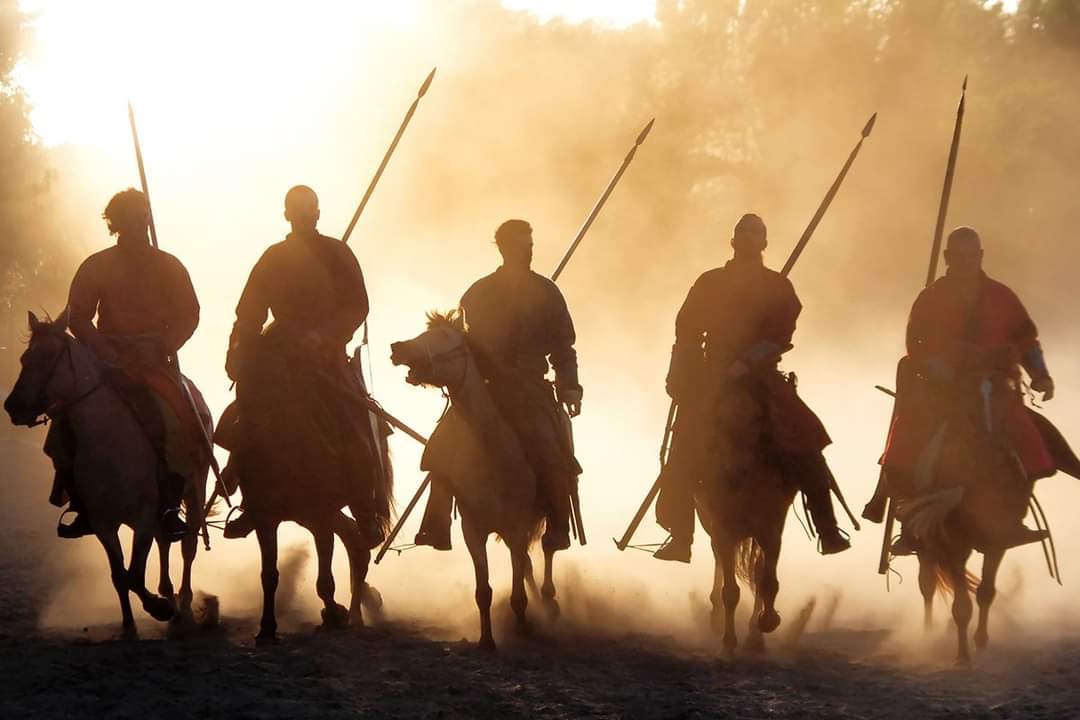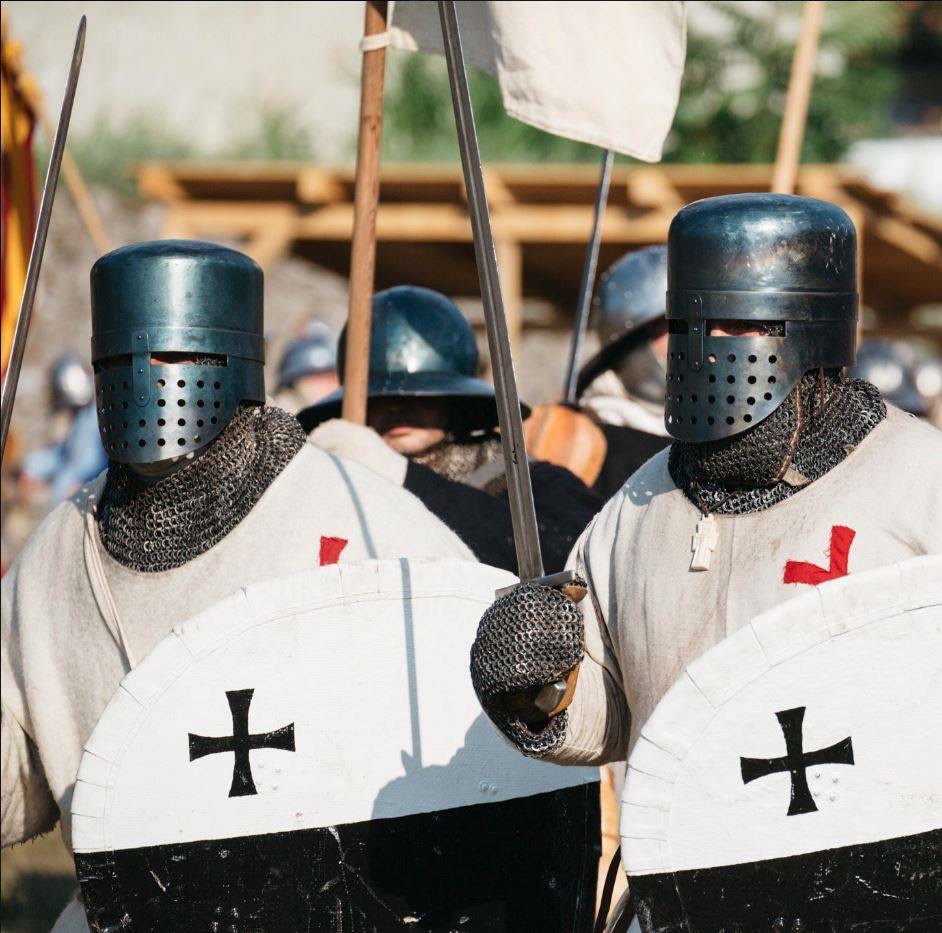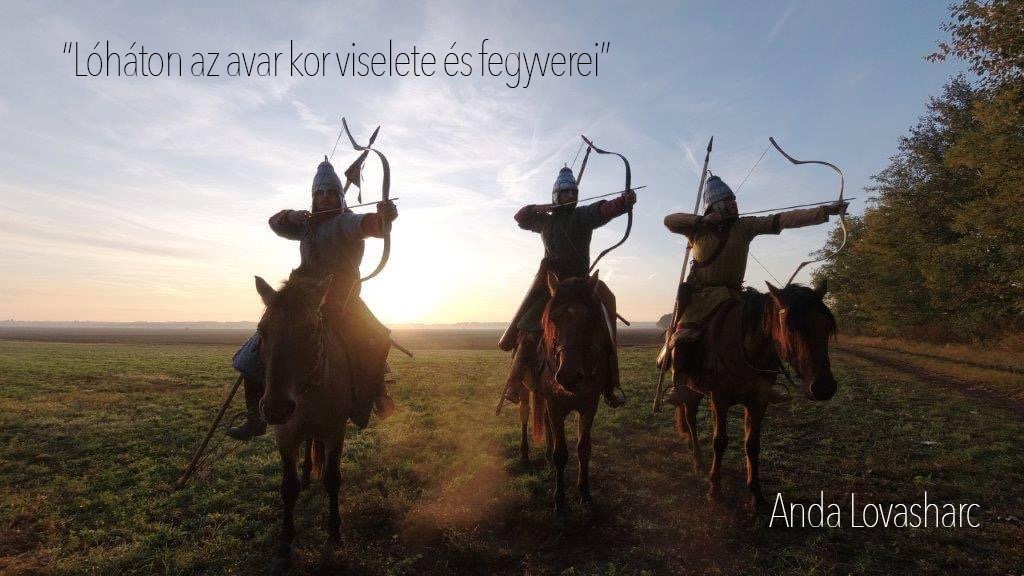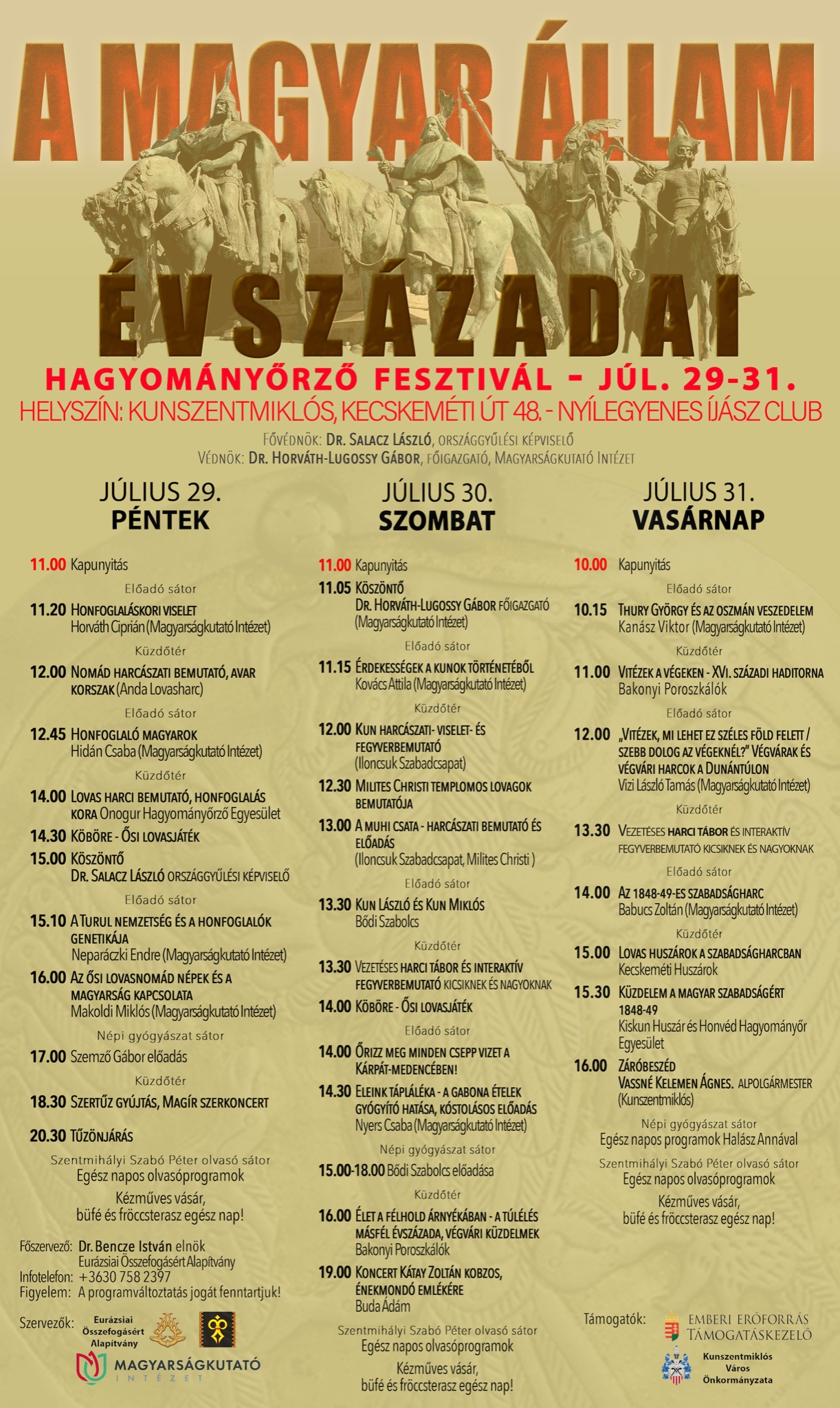A festival of heritage preservation kicks off in Kunszentmiklós
The Eurasian Alliance Foundation is organising a three-day traditional festival entitled Centuries of the Hungarian State in Kunszentmiklós between 29 and 31 July. The festival will commemorate significant events in Hungarian history with horse and foot cavalry jousting demonstrations, exciting performances, cultural events and craftsmen.
The aim of the programme is to give visitors and families a chance to experience a major event in the history of the Hungarian state. The event is co-organised by the Institute of Hungarian Research. The main patron of the event is László Salacz, Member of Parliament. István Bencze, President of the Eurasian Alliance Foundation and organiser of the festival, was interviewed by Miklós Csejk, editor of Magyar Nemzet.
- The festival will commemorate significant events in Hungarian history through military traditions, educational presentations, cultural performances and interactive craft activities. The aim of the programme is to make the visitors and families experience some of the most significant events of the centuries of the Hungarian state through spectacular presentations and performances," István Bencze, President of the Eurasian Alliance Foundation, told our newspaper.

Traditional cavalry and foot guards from the times of the Avars and the conquest of Hungary, the Crusades, the Cumans, the border fortress warfare, the revolution of 1848/49 will recall the fateful events of the Hungarian state, with demonstrations and show battles accompanied by music and narration. Tradition-keepers dressed in period costume and carrying weapons, depict the century by setting up a war tent camp representing each era.
István Bencze, President of the Eurasian Alliance Foundation, highlighted that the military tent camps are open to children and adults throughout the event. In between the demonstrations, supervised trials of armour, helmets, shields and polyfoam swords will be available, so that adults and children can experience the everyday life of warriors.
- The preservation of traditions and the cultivation of Hungarian historical traditions have been given a great impetus by the scientific work conducted at the Institute of Hungarian Research, and the sharing of results both in the form of scientific conferences and educational lectures. On all three days of the festival, the staff of the Institute of Hungarian Research will give fascinating lectures on little-known aspects of Hungarian history and new research findings," Bencze noted.
On the opening day, Endre Neparáczki will present the latest archaeogenetic research on the Turul clan and the conquerors, Ciprián Horváth will talk about the clothing of the conquest period, Csaba Hidán about the weapons, fighting style and lifestyle of the conquerors, and Miklós Makoldi will give a lecture on the relationship between the ancient equestrian peoples and the Hungarians. The Anda Equestrian Combat Club will recall the Avar period with its equestrian show, while the horsemen of the Onogur Traditional Horse-Riding Association will take the audience on a journey to the Age of Conquest. The day will end with a Magír Szerkoncert and, for the brave, a walk on embers.

On Saturday, Attila Kovács will present interesting facts about the history of the Cumans. Szabolcs Bődi will give a lecture about King László the Cuman and Miklós Kun, in which he will describe the tales and legends collected in the Kunszentmiklós area about the tragic regicide. In the afternoon, Csaba Nyers, a traditionalist, master chef, will introduce the cereal dishes of our ancestors and their healing effects. During the presentation, you will also have the opportunity to taste various delicious spelt and buckwheat-based dishes and sandwich creams.
- The memory of the Battle of Mohi will be commemorated by the traditional Hungarian Ilunchuk Free Troop and the Milites Christi Crusaders' war tournament. The Bakonyi Poroszkálók Team will re-live the man-trying century and a half when the Kingdom of Hungary, once a great power in Europe providing prosperity and security, was split into three parts. There was constant fighting, and bands of raiders and marauders, who also traded in human beings, raided the territory. In the age of the border fortress knights, hunting was no longer a noble sport, but a means of securing a daily meal. Zoltán Tóth, President of the National Coursing Association, will be talking about this on Saturday afternoon and Sunday morning, introducing the Hungarian greyhound, the faithful companion of the warriors. After the greyhound demonstration, visitors will have the opportunity to get to know the greyhounds themselves, to pet them and to chat informally about the breed," said István Bencze.

Saturday's programme will include the programme "Preserve every drop of water in the Carpathian Basin", which will raise awareness of the tragically rapid depletion of the Carpathian Basin's water resources and explain ways in which individuals and families can help slow down the process. In the evening, Zoltán Kátay, the recently deceased Kossuth Prize-winning singer will be remembered. The concert will be given by Ádám Buda, Tinódi Prize-winning singer.
On Sunday morning, the presentation of the Ottoman rule continues. Viktor Kanász will give a lecture on the forgotten contemporary of Dobó and Zrínyi, Captain György Thury and the Ottoman peril. This will be followed by a war tournament performance by the Bakony Poroszkálók Team called Knights of the Border Fortresses, and then a greyhound demonstration. László Tamás Vizi will give a lecture on "Border Fortresses and Fighting in the Transdanubia Region", while Zoltán Babucs will recall the 1848/49 War of Independence. The event will close with a presentation by the Hussars of Kecskemét.
- As today's events are having an ever-increasing and difficult-to-process negative impact on the lives of individuals and families, healing talks will be held in the folk medicine tent on all three days of the event. On Friday, visitors can talk with Gábor Szemző about self-healing of body and soul, on Saturday with Szabolcs Bődi about loss management and folk traditions of mourning, and on Sunday with Anna Halász about the spiritual causes of illnesses and treatment options over a glass of delicious herbal tea," said István Bencze.
On all three days, the Péter Szentmihályi Szabó novel reading tent will be open, where visitors will have the opportunity to discover a novel from the novel cycle that started in the Avar period and covers a large part of our history, and to spend the whole day reading. A Runa tent, a craft fair, an ancient equestrian sports game and a wine terrace will add colour to the three-day festival.

- I am convinced that in the zone between the Carpathian Basin and the Altai Mountains, our ancestors were present, and our brothers and sisters to the east are present. Over the centuries, the pace of outflows and retreats has been determined to a large extent by military action. The best example of this is the dominant presence of the Huns in the Carpathian Basin in the 4th to 5th centuries, and their retreat to Scythia under Prince Csaba after the death of our King Attila. Csaba's son, Edemen, then returned to the Carpathian Basin with the Huns and the Khwarazm warriors from his mother's clan, as recorded by Simon Kézai in his Chronicle of the Hungarians. It was this pulsating, living movement that I wanted to bring to life with my expeditions on horseback, which took me through the Caucasus, Kazakhstan and as far as Mongolia. I have been working with Gábor Magyar and his sons, Zsombor Magyar and Koppán Magyar, in preserving the equestrian tradition from the very beginning. To my great joy, the Director of the Institute of Hungarian Research, Gábor Horváth-Lugossy, who visited historical pilgrimage sites on horseback in Mongolia, joined the movement of equestrian tradition preservation. The scientific work of the Institute of Hungarian Research provides a solid background for all forms of heritage preservation, including horseback riding, handicrafts and military traditions, and plays an important role in helping young people to take over the baton from the older generation, added István Bencze, President of the Eurasian Alliance Foundation and organiser of the festival, who is himself a horse-riding heritage preservationist.
To read the report on the traditional festival, click on the page of Magyar Nemzet